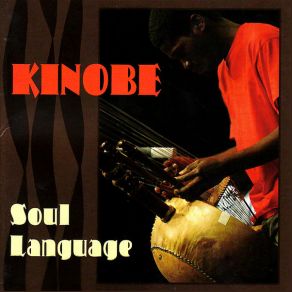Soul Language
Download links and information about Soul Language by Kinobe. This album was released in 2008 and it belongs to World Music genres. It contains 12 tracks with total duration of 56:06 minutes.

|
|
|---|---|
| Artist: | Kinobe |
| Release date: | 2008 |
| Genre: | World Music |
| Tracks: | 12 |
| Duration: | 56:06 |
| Buy it NOW at: | |
| Buy on iTunes $9.99 | |
| Buy on Amazon $8.99 | |
Tracks
[Edit]| No. | Title | Length |
|---|---|---|
| 1. | Kamungolo | 3:59 |
| 2. | Bamunanika | 6:43 |
| 3. | Wagongolo | 5:14 |
| 4. | Empewo | 7:57 |
| 5. | Tumwagala Nyo | 4:14 |
| 6. | Bakulimba | 4:15 |
| 7. | Mubaleete | 4:04 |
| 8. | Mwana Wange | 4:20 |
| 9. | Kikwabanga | 4:20 |
| 10. | Nakwagala Nkulaba | 3:08 |
| 11. | Tutambula | 3:08 |
| 12. | Lucejjere | 4:44 |
Details
[Edit]Kinobe is a singer/songwriter, instrument maker, and multi-instrumentalist; he plays guitar, kora (West African harp), adungu (Ugandan harp), kalimba, endongo (bowed lyre), endingidi (tube fiddle) and endere (flute) from Bugerere, Uganda. An early virtuoso on many stringed instruments, he has toured Africa and Europe in various bands since he was a teenager. He's studied kora with Mali's Toumani Diabaté and played with Youssou N'Dour and Salif Keita. On this set, his first international release, the sound is acoustic and stripped down, showcasing Kinobe's understated vocals and instrumental prowess. The ambient sounds of the jungle night open "Kamungolo" a lilting melody that tells of a wandering old man nicknamed Kamungolo, who is sustained by the handouts of more fortunate villagers. It's a strong tune driven by subtle percussion, pulsing kora and thumb piano, and a refrain that imprints itself into your mind after a single listen. "Mubaleete" ("Bring Them") is a beautiful, flowing kora lullaby, while "Mwana Wange" is a forte of African blues guitar with a hint of Mali in its structure, decrying the hardships many children face in hard times. "Tutambula" ("We Are Walking) is a jittery instrumental featuring what sounds like a balafon. It paints a pastoral portrait of herdsmen walking long distances through the plains looking for a place to feed their cattle. "Empewo" ("Wind") features Kinobe's delicate harp work and Michael Ouma's bluesy guitar, which adds mournful bent notes and sitar-like runs to the composition. The album is low-key and contemplative, even on up-tempo numbers like "Lucejjera," a tune about a plague of locusts that features the jazzy popping bass work of Allan Okia. Kinobe's Soul Language is a unassuming album, one that slowly wins you over with its restrained grooves and effortless virtuosity. ~ j. poet, Rovi